Individualized Real-World Learning Transcript
+++ 00:00:01 +++
Card:
Deeper Learning Competencies
•Master core academic content
•Think critically and solve complex problems
•Work collaboratively
•Communicate effectively
•Learn how to learn
•Develop academic mindsets
+++ 00:00:34 +++
Student: My official title is the Water Quality Monitoring Lab Intern.
Elliot Washor: Big Picture's Learning's mission is to educate one student at a time in a community of learners.
Student: Today, I'm going to be going over search and rescue, and search and rescue basics.
Myeshia Whigham: Internships are the main focus, because we want our students to have that hands-on connection to the real world.
Nathan: It's giving me experience by being in a real world scenario.
Debra Villegas: If you keep it that simple, you'll always score.
+++ 00:01:01 +++
Elliot Washor: You want the real-world component as well as the academic component to really see if there's depth in the understanding.
Myeshia Whigham: What did you do during this process?
Nathan: I got to actually do the procedure. It was really neat, just ’cause I got to actually experience that.
Card:
Individualized Real-World Learning
featured organization:
Big Picture Learning
Card:
San Diego MET High School
San Diego, CA
Card:
Elliot Washor
Co-Director
Big Picture Learning
+++ 00:01:31 +++
Elliot Washor: If you don't bring in deeper learning, 21st Century skills and critical thinking, problem solving in the context of each and every student having real choice, real challenge, time to practice the right time, all those pieces, without it, we're not going to move the needle.
Card:
12th Grade Internship Exhibitions
Alisa Kollova: My name is Alisa Kollova [ph?], and I intern at A-Comp, which is a global civil engineering firm.
Card:
Myeshia Whigham
12 Grade Advisor
San Diego MET High School
Myeshia Whigham: Internships are the main focus, because we want our students to have that hands-on connection that we can't necessarily provide within the four walls of our classroom.
+++ 00:02:05 +++
Nathan: I'm Nathan Shaw. I'm a senior and I'm 17. The MET's totally different than a traditional public school. I mean, I get bored really, and through the internship at the MET, I don't ever get bored. I mean, I'm always learning something when I come to my internship. I'm-- always something new.
Card:
Kearny Mesa Veterinary Center
Nathan's Internship
Myeshia Whigham: Making those connections in the community helps them create a choice beyond their four years in high school, college major, career path. So we think that the internships along with their high school curriculum is a great partnership.
+++ 00:02:39 +++
Veterinarian: I know it stings, I'm sorry. Oh, poor baby.
Myeshia Whigham: How that leads to deeper learning is the fact that they are alongside professionals. They are able to ask those probing questions.
Casey Sanders: This is the most cooperative patient we have just about.
Nathan: Mm-hm.
Card:
Casey Sanders
Nathan's Mentor
Kearny Mesa Veterinary Center
+++ 00:02:55 +++
Casey Sanders: My goals for our interns are to grow them as people. I want to help them realize their potential in the world. And watching them blossom makes me very happy.
Nurse: She got at it a little bit this weekend, and he said that he wasn't sure if she pulled any out. It doesn't look like she pulled any out, but it's a little swollen.
Doctor: Yeah, she looks normal.
Nurse: Fine, yeah.
Casey Sanders: Our internship program is trained exactly like any entry-level employee. They get the same skill sheets for training. And the interns actually become an integral part of the practice.
Nurse: Happy little girl!
+++ 00:03:35 +++
Myeshia Whigham: We work with the mentors as far as helping the mentor and the student develop their LTI project, which is a Learning Through Internship project. The students have to prove to me that they're meeting the learning goals. They have to prove to me that it's authentic and real-world learning. They have to prove to me that they're doing research behind their internship. So there're several factors that I check for and I ask when I visit their internship.
Myeshia Whigham: Well, the growth that they're doing-- taking out of the dog, have you-- have any of your dogs had that same growth?
+++ 00:04:06 +++
Nathan: No, I actually don't know-- Dr. Marvel, where is the growth on the beagle?
Doctor Marvel: On the thorax, on the chest.
Nathan: All righty. No, my dogs don't have them, they're still young.
Casey Sanders: They're great hands once they get trained, they just jump right in and do whatever needs to be done.
+++ 00:04:27 +++
Nathan: I had to help pre the dog. Hold the dog for the catheter, and then I monitored it in the surgery while assisting the doctor. We use a little bit of every subject through the internship. We use science to find out what chemicals we need, what the chemical does, like atropine, it speeds up the heart rate, so if a dog has low heart rate, we give atropine. We use math to find out how much chemicals or solutions we have to use on the dog to make sure it's not too much or too little. If we give it too much, we could kill the dog; we give it too little, it could not do anything.
+++ 00:05:07 +++
Nathan: Can you redo the blood pressure? It stopped working.
Nathan: The teachers actually let you incorporate science from your internship into your class to get extra credit, so I did a paper on how much medicine the dog needed and what the medicine did to the body, and how the body reacts to it.
Casey Sanders: It's pretty monumental, actually, I think for a lot of them. They get to see that it's not just all fuzzy puppies and kittens.
+++ 00:05:39 +++
Nathan: It's given me real-world experience by being in a real-world scenario, real clients, real situations with animals. So everything is really preparing me for actually working in the vet.
Myeshia Whigham: It increased his confidence level, and his ability to share and articulate like what he's doing every day. And I think that's going to be a skill that he's going to take with him.
+++ 00:06:03 +++
Casey Sanders: Everybody kind of likes working with you, so you fit in really well.
Nathan: Thank you. Is it just ’cause I bring food?
Casey Sanders: Well, that helps. You know, it keeps the natives quiet and all.
Elliot Washor: We have a combination of career and technical education, social/emotional learning, deeper learning, which is the 21st Century skills as well as social/emotional tied to academics to engage students.
+++ 00:06:32 +++
Student: My official title is the Water Quality Monitoring Lab Intern.
Student: What would you do differently?
Nathan: Work harder in school.
Elliot Washor: There are a lot of skills that are the deeper learning skills that shouldn't be pulled apart. And the academics should not be pulled apart as well. Everything should flow as a whole, because you're a whole student.
Student: Today, I'm going to be going over search and rescue and search and rescue basics.
Card:
Debra Villegas
10th Grade Advisor
Sand Diego MET High School
Debra Villegas: Tuesday and Thursday is all about internships. Monday, Wednesday, Friday is all about the academic. And it's about the rigor in the classroom.
Card:
10th Grade Student Advisory
+++ 00:07:05 +++
Debra Villegas: Out of this list, narrative, expository, persuasive, descriptive, which one fits that category?
Student: The expository?
Debra Villegas: Yes. It's expository. Okay, remember.
Debra Villegas: The rubrics are the basis or the expectations of the class. And we really look at what the outcomes should look like, so backwards planning, and then unpacking the standards.
Debra Villegas: Lead hook, thesis statement, transition.
+++ 00:07:32 +++
Elliot Washor: There's a learning plan, and your learning is managed. And people at the school level know you and your families well and know your interests and needs in brining those pieces in. I think that those are the ways that the system needs to operate in order to get to deeper learning.
Card:
12th Grade Internship Exhibitions
Myeshia Whigham: I want you to get out a regular piece of paper for your Cornell Notes. Taking notes on Nathan's exhibition, and just put proper heading, and title it "English."
+++ 00:08:01 +++
Myeshia Whigham: At the end of the semester, they present their LTI project during that exhibition, and during that exhibition, they invite their mentor, their parents, people in the community to see what they have been doing at their internship for that semester.
Card:
Christopher Shaw
Nathan's Father
Christopher Shaw: One of the nice things about the internships is he wouldn't have that type of experience in a normal, traditional high school. So that has helped him grow a lot, and helped him decide what he'd like to do further on in life.
+++ 00:08:33 +++
Nathan: All righty, so I'm Nathan Shaw, and this is finally the last senior high school exhibition. So I put this warning ’cause I know there's some sensitive people in here to like blood and stuff. So if you're very sensitive, you might not want to look at these pictures. So this is the Day 1 picture. This is after we cleaned it. I didn't get a picture beforehand, because it was disgusting.
Myeshia Whigham: Is that all the way to the bone?
+++ 00:08:56 +++
Nathan: Yep, this is a tendon right here, and then that's the bone. So it's pretty gruesome, and the cat was obviously in pain, that's why it wasn't letting the owner get near it. They drained the rest of this, because you can see it's swollen. There was pus underneath it, so they had to drain it, and then they just pinched it together, and then they sutured it.
Myeshia Whigham: What did you do during this process?
+++ 00:09:16 +++
Nathan: I got to actually do the procedure. They were watching over me, making sure I was doing everything right, and it was really neat, just ’cause I got to actually experience that.
Myeshia Whigham: I know that student, I know their learning style, I know what they're capable of. I know what they have been doing all year. You know, I know how hard they've worked at their internship. I know how passionate it is. I've talked to their mentor. I've talked to their teachers. I've seen their work. You know, so those are factors that I use when I am assessing my students.
+++ 00:09:43 +++
Nathan: What I've learned throughout the four years, get it done. You know, you may not like it, but you got to do it in the end. I do a lot the same. I mean, I had fun through high school. That's what you're supposed to do. You're supposed to make it enjoyable.
Elliot Washor: It's about practice, and that the practical side is very powerful and very important. That the hands-on side, that grasping proceeds language. And that in order to understand the world, you have to get your hands dirty, and hold it, and have the ability to challenge yourself, to make mistakes, to do things at the right time, and to surround yourself by people and text you can learn from.
#### End of big_picture_learning___indivdualized_real_world_learning

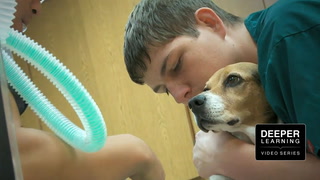
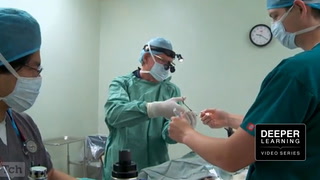
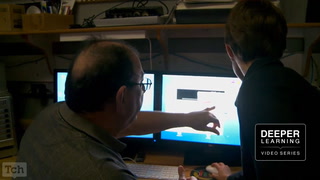
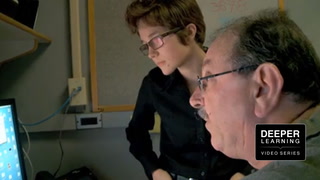
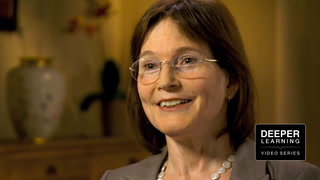








78 Comments
Susan Hancock Jul 29, 2020 10:42am
This video is a great example of real world learning and community involvement. I am an elementary teacher, but this is somehting that would be wonderful to discuss with my 5th graders. We could create "internships" by letting students direct a play, choreograph a dance, make sets and props and run a show. Giving kids the opportunnity to create something or be a part of somehting that they create or anticipate in, is a wonderful teaching tool.
Jessica Marze Jul 27, 2020 3:05pm
Internships are a great way to provide learning through experience. It also gives them opportunities to develop relationships with community members in hopes that those relationships will provide opportunities later. By utilizing internships as a form of teaching, students are provided with opportunities to see what they may be interested in as far a career path. It also helps to grow them socially in real life situations.
Cheryl Harper Jul 27, 2020 2:15pm
Favorite quotes that I absolutely love from this video:
"I want to grow them as people!" and
"To understand the world you have to get your hands dirty and to surround yourself people and text you can learn from."
Take away from them: Grow students as problems solvers and deep thinkers so they can can learn and manuever through the real world and they are able to invest, engage and learn from others.
Kevin Pettit Jul 27, 2020 12:54pm
I have been a big advocate of internships since I first heard about how German schools used them in the '80's. Internships seem to be a no brainer, I believe all high schools should incorporate this into their curriculum. There is more work involved in getting these internships set up, monitoring them, arranging for funds, the list is long to make this work. However, I think this is something that would have a huge, positive effect on education.
Hope Lights Jul 27, 2020 12:11pm
Experience is the best teachers. Students can benfit from learning outside the walls of the school because it is active learning in which they will encounter authentic real world problems. Internships as a part of school will be very benifical to students whose families don't have "connections". Progams should be designed to promote the relevance and increase the rigor of the high school experience. Schools can partner with communtiy businesses, non-profit organizations, or government agencies to provide opportunity for students to spend time gaining hands on experience through a progam designed to build relationships, and produce results. Schools could rigorously assess internships through the use of portfolios, oral presentaions on their internship experience, or with a senior project.